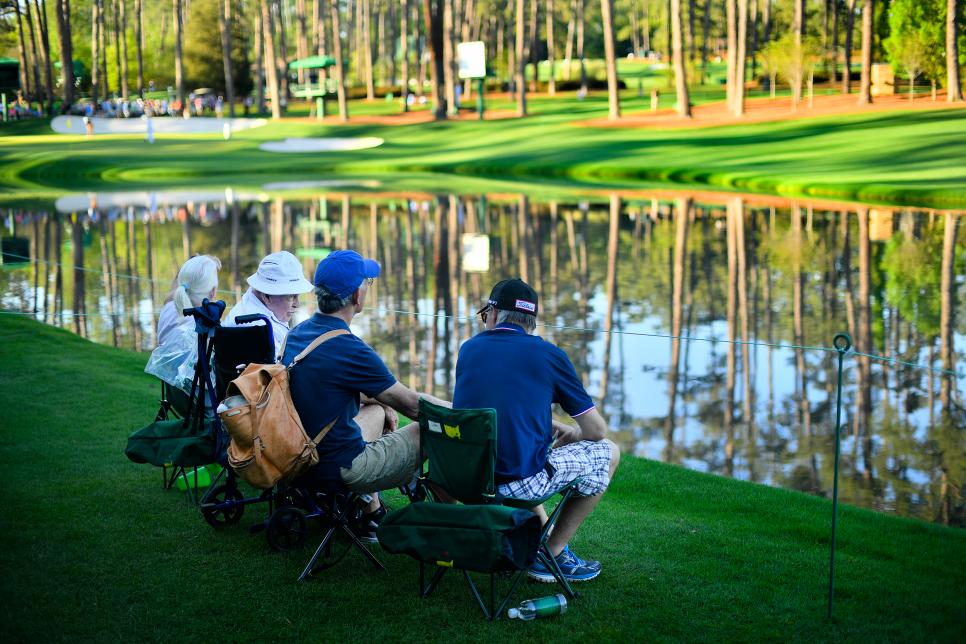News
Do we have to call them ‘patrons’ at the Masters just because Augusta National wants us to?

A journalist’s job description is difficult to distill in two words, but two words often stressed are accuracy and clarity. We seek to present a story as it is, and we hope to do so in a way that an audience can understand.
For some reason, I think of this every year around the Masters because of the use of the word “patron,” which at Augusta National is what they use to describe the men and women who watch the tournament in person. Other golf tournaments have fans. The Masters has patrons.
The use of the word traces to Clifford Roberts, Augusta National’s co-founder with Bobby Jones, who sought to distinguish spectators at the Masters because he saw them as more than butts in seats, but consumers of an experience—no different than regular patrons of a restaurant or an opera.
“Roberts really did feel that it was the spectators who made the Masters possible—hence patrons,” says David Owen, author of the definitive history of Augusta National, The Making Of The Masters. “He wanted to remind everyone involved in the tournament that the focus had to be on constantly improving the experience for the people watching.”

Augusta National
For decades, because the men who run the Masters refer to attendees as patrons, media outlets have followed suit. Disregard broadcasters CBS and ESPN from this discussion because they are rights holders and essentially at the mercy of Augusta National’s dictates. They use patron because they have to, in the same way the club requires them to use “first and second nine” rather than “front and back.”
But other outlets not bound by the club’s demands use it, too, and only here. The lede to the New York Times’ account of Tiger Woods’ opening round on Thursday began by describing the “Masters patrons who flocked to watch Tiger Woods’s first round of a major tournament in 963 days.” Scott Michaux, columnist for the tournament’s hometown paper, the Augusta Chronicle, says he uses patron this week because it feels integral to the Masters’ character. “I don’t use it anywhere else. Just like I'd never use the term ‘car park’ anywhere but the British Open,” Michaux says. “I tend to think of the lingo as part of event.” (At Golf Digest, use of the word is at the discretion of the writer).
In his first press conference as Augusta National chairman on Wednesday, Fred Ridley not surprisingly referenced the experience for “patrons,” but even reporters felt compelled to use the word as well. Consider this question:
Increasingly (on) the tour this year, players have complained about unruly crowds. That doesn't happen here. What is the club's philosophy behind the rules regarding the patrons?
Again, the rest of the PGA Tour has “crowds,” but at Augusta National, they are “patrons.”

JD Cuban
To Michaux and others, the reasons you call fans patrons at the Masters because this one week a year, that’s what they are. Again, it’s a question of accuracy, in a sense no different than calling Theresa May the prime minister of the United Kingdom. We might prefer to call our heads of state “presidents,” but the title designation isn’t ours to choose.
OK, fine. But the other way to look at it is that outside of the scarcity of tickets and the prestige of the event, a person who goes to the Masters is essentially the same as someone who goes to the U.S. Open, or any other golf tournament. They pay their money, they watch the golf, they are confined to outside the ropes. By all other measures, they are “fans” or “spectators” or members of a “gallery.” In the interest of clarity, why assign an elusive word to describe them just because the club prefers it that way?
It’s worth noting that even Owen, who was given rare access to Augusta National’s extensive archives when researching, was averse to using the word patrons in the book, and got flack about it from then-chairman Jackson Stephens as a result.
“I called them spectators in my book, because that’s what I call them,” Owen said. “Jack Stephens said something like, ‘Why don’t you call them what Cliff called them?’ But I disagreed with him.”
Perhaps the last word on this should go to Golf Digest’s writer-at-large Dan Jenkins, who has attended the Masters since 1951, knew Clifford Roberts well and knows even better the distinction between tradition and pretension.
“I never called them ‘patrons,’” Jenkins said. “It never occurred to me to use the term. I called them fans. I thought a ‘patrons’ was a sponsor or someone who didn’t know much about golf."